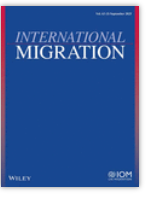Negotiating De Facto Borders: The Case of Social Services Provision in Abkhazia and Transnistria

This is an open-access article.
Following the dissolution of the USSR, the restructuring of borders reshaped a space previously characterized by territorial continuity. While many of these borders gained international recognition, others, like those of Abkhazia and Transnistria, remained de facto, lacking acknowledgement from most sovereign states. Despite scholarly recognition that de facto statehood is detrimental to social welfare, the impact of contested borders on welfare provisions remains underexplored. this article analyses how this multiplication of contested (in)tangible borders impacts the activities of Civil Society Organisations (CSOs) as crucial actors in the provision of social services in Transnistria and Abkhazia. The complex geopolitical dynamics of these borderlands necessitate an examination of border-making practices, considering the interplay between Transnistrian and Abkhazian CSOs, Moldovan and Georgian authorities, and Transnistrian and Abkhazian authorities. International organizations, donors, and Russia also play substantial roles. The analysis reveals that each actor controls critical resources such as access, funding, know-how, and symbolic capital. Consequently, CSOs exhibit agency both locally, when interacting with de facto authorities, and at regional and international levels when engaging with external donors and organizations.








